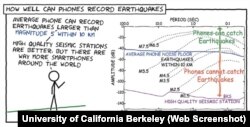A new phone app uses vibrations from smartphones to alert people about earthquakes.
The phone app recognizes sudden shaking of the earth's surface through sensors in smartphones.
The new app is called MyShake. It is the work of four researchers at the University of California, Berkeley. They said they created a worldwide warning system that would inform people and give them time to prepare.
Other earthquake apps include QuakeFeed, Quakes and Earthquake. They show where earthquakes have happened, at what strength, and the aftershocks. Those use data from the U.S. Geological Survey.
The MyShake app is available only for Android phones.
How MyShake Works
Smart phones are equipped with accelerometers. These instruments measure movement, like that of a car or airplane. They can also measure the shaking of a machine, building or other structure.
Accelerometers are used in activity trackers and apps that count steps or other exercise. They also are used in global positioning system apps, also called GPS.
MyShake uses phone accelerometers to measure seismic activity. It has been programmed to know the difference between normal activity and earthquake movement. The software developers say their app is right 93 percent of the time.
A smartphone sends seismic information to the app developers. If the developers receive several notifications from one area, it recognizes that an earthquake may be taking place or will take place soon.
Using information sent from the app, the network then estimates the location and strength of the quake in real time. MyShake can record magnitude 5.0 earthquakes at distances of 10 kilometers or less.
MyShake uses very little power, according to its developers. Only when seismic activity is sensed by the app does it become active and sends data to the network.
This video shows how MyShake works:
The app works best when your phone is resting on a flat surface, like a table.
The developers hope that MyShake can add to information collected by the U.S. Geological Survey. That U.S. agency has created the Earthquake Early Warning System, also known as the EEW. The EEW has deployed sensors for measuring quakes in many areas. In places where no such equipment exists, MyShake may be the only method of early quake detection.
The app also shows ways to stay safer during an earthquake. The developers say it will become more effective as more people use it.
"Our goal is to build a worldwide seismic network and use the data to reduce the effects of earthquakes on us as individuals and on society as a whole," say the researchers.
The developers say they hope to add a feature that would warn people about a possible tsunami, or the huge waves after an earthquake.
I’m Kathleen Struck.
Carolyn Nicander Mohr wrote this story for Learning English. The editors were George Grow and Kathleen Struck.
Do you live in an earthquake zone? Do you use any earthquake apps? Share your thoughts in the Comments section below and on our Facebook page.
________________________________________________________________
Words in This Story
vibration - n. movement
alert - v. to inform or warn
data - n. information of facts often used to plan something
detect - v. to discover or notice the presence of (something that is hidden or hard to see, hear, taste, etc.)
network - n. a system of computers and other devices
accelerometer - n. a device that detects its own acceleration and is used in mobile phones to determine the phone's orientation
tracker - n. a device that follows and records the movements of someone or something
seismic - adj. relating to, or caused by an earthquake
program - v. to give (a computer) a set of instructions to perform a particular action: to create a program for (a computer)
anonymous - adj. not named or identified
location - n. a place or position
table - n. a piece of furniture that has a flat top and one or more legs
magnitude - n. the size, extent, or importance of something
feature - n. an interesting or important part, quality, ability, etc.
tsunami - n. a very high, large wave usually caused by an earthquake






